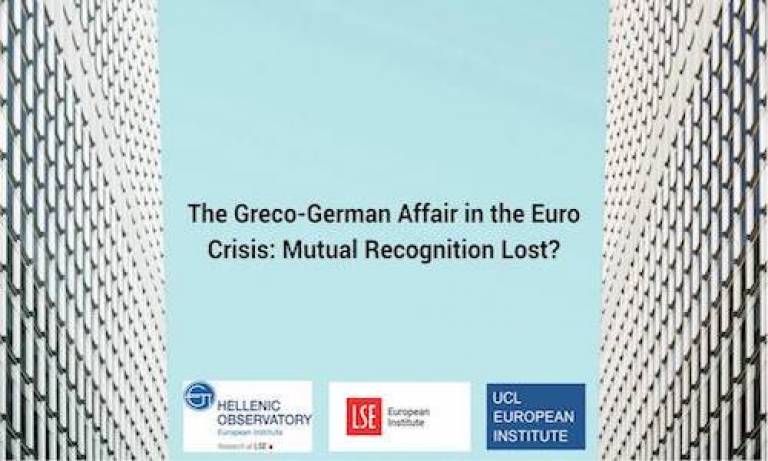The Greco-German Affair in the Euro Crisis: Mutual Recognition Lost
20 March 2018, 6:30 pm–8:00 pm

Event Information
Open to
- All
Co-authors Claudia Sternberg (UCL EI), Kira Gartzou-Katsouyanni and Kalypso Nicolaidis in conversation with Jonathan White and Kevin Featherstone. Co-hosted with the LSE's European Institute and Hellenic Observatory.
Tuesday, 20 March, 6:30pm-8:00pm
|
When: |
| Tuesday, 20 March, 6:30pm-8:00pm |
| Where: |
|
Hong Kong Theatre |
The new book The Greco-German Affair in the Euro Crisis: Mutual Recognition Lost? focuses on one of the most highly charged relationships of the Euro crisis, that between Greece and Germany, from 2009 to 2015. It explores the many ways in which Greeks and Germans represented and often insulted one another in the media, how their self-understanding shifted in the process, and how this in turn affected their respective appraisal of the EU and that which divides us or keeps us together as Europeans. These stories illustrate the book's broader argument about mutual recognition, an idea and norm at the very heart of the European project.
The book is constructed around a normative pivot. On one hand, the authors suggest that the tumultuous affair between the two peoples can be read as "mutual recognition lost" through a thousand cuts. On the other, they argue that the relationship has only bent rather than broken down, opening the potential for a renewed promise of mutual recognition and an ethos of "fair play" that may even re-source the EU as a whole. The book's engaging story and original argument may appeal not only to experts of European politics and democracy, but also to interested or emotionally invested citizens, of whatever nationality.
The Greek and German Foreign Ministers say:
'a highly valuable insight into the complexity of Greek-German relations within the EU and into the role of unjust stereotypes ...' (Nikos Kotzias)
'This book is exceptional ... manages to reshape our awareness of key European values.' (Sigmar Gabriel)
Speakers:
- Kira Gartzou-Katsouyanni is a PhD student at the European Institute, LSE. Previously, she worked at the European Commission in Brussels and Athens.
- Kalypso Nicolaïdis is Professor of International Relations and Director of the Centre for International Studies at the University of Oxford, UK. She is Chair of Southeastern European Studies at Oxford and Council Member of the European Council of Foreign Relations.
- Claudia Sternberg is Senior Research Associate at the UCL European Institute. Her first monograph The Struggle for EU Legitimacy won the UACES Best Book Prize.
Discussants:
- Jonathan White is Professor of Politics at the European Institute, LSE.
- Kevin Featherstone is Professor of Contemporary Greek Studies and of European Politics at the LSE, and Head of the LSE European Institute.
Chair:
- Waltraud Schelkle is Associate Professor of Political Economy at the European Institute, LSE.
The LSE European Institute (@LSEEI) is a centre for research and graduate teaching on the processes of integration and fragmentation within Europe.
The LSE Hellenic Observatory (@HO_LSE) is internationally recognised as one of the premier research centres on contemporary Greece and Cyprus. It engages in a range of activities, including developing and supporting academic and policy-related research; organisation of conferences, seminars and workshops; academic exchange through visiting fellowships and internships; as well as teaching at the graduate level through LSE's European Institute.
The UCL European Institute (@UCL_EI) is UCL's hub for research, collaboration and information on Europe and the European Union. It offers a diverse programme of public events, provide expert analysis and commentary for media outlets and policymakers, and help coordinate and develop networks of research.
Twitter Hashtag for this event: #LSEEurocrisis
 Close
Close

